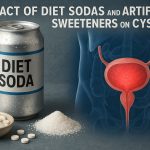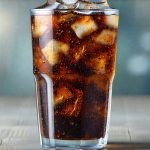Urinary tract pain – encompassing symptoms like burning sensations during urination, frequent urges to go, lower abdominal discomfort, and even back pain – is incredibly disruptive and can significantly impact quality of life. Many factors contribute to this type of pain, ranging from simple dehydration to bacterial infections (UTIs) or underlying medical conditions. Consequently, people experiencing these issues often meticulously examine their lifestyle choices, including dietary habits, in search of potential triggers or ways to alleviate symptoms. This leads to a common question: could something seemingly innocuous like diet soda be playing a role? The link between diet soda and urinary tract discomfort isn’t straightforward, but it’s rooted in the complex interplay between hydration, acidity, artificial sweeteners, and individual sensitivities.
The prevalence of diet sodas as a ‘healthier’ alternative to sugary drinks often creates a false sense of security. While eliminating added sugar is beneficial for overall health, the substitutes used – typically artificial sweeteners and acidic compounds – can introduce their own set of concerns when it comes to urinary tract health. It’s crucial to understand that this isn’t about demonizing diet soda entirely; rather, it’s about exploring potential connections and empowering individuals with information to make informed choices based on their specific needs and sensitivities. We will delve into the ways these beverages might contribute to discomfort, what the current research suggests, and strategies for managing urinary tract health effectively.
The Role of Acidity & Hydration
Diet sodas are notoriously acidic, often containing phosphoric acid or citric acid to enhance flavor and preserve shelf life. This acidity is a primary area of concern when considering its impact on the urinary tract. A highly acidic urine environment can exacerbate symptoms for individuals prone to bladder sensitivity or interstitial cystitis (IC), also known as painful bladder syndrome. – Increased acidity may irritate the bladder lining, leading to more frequent and intense pain episodes. – Prolonged exposure to acidic urine could potentially worsen inflammation already present in the urinary tract. – Some studies suggest a correlation between high dietary acid intake and increased frequency of IC symptoms, although establishing direct causation is challenging. The acidity isn’t just about the soda itself; it’s also about how it affects overall hydration. Many people choose diet soda instead of water, leading to decreased fluid intake. Proper hydration is fundamental to urinary tract health. Water dilutes urine, reducing its acidity and flushing out potential irritants or bacteria. When you’re not adequately hydrated, your urine becomes more concentrated, intensifying any existing irritation and increasing the risk of bacterial growth.
The effect of diet soda on hydration isn’t always intuitive. While it is a liquid, the caffeine content in many diet sodas can have a mild diuretic effect, meaning it encourages the body to eliminate fluids. This further contributes to dehydration if not counterbalanced by sufficient water intake. Furthermore, some artificial sweeteners might disrupt fluid balance within the body, though this is still an area of ongoing research. Essentially, relying heavily on diet soda for hydration creates a vicious cycle: acidity irritates the bladder, dehydration concentrates urine, and caffeine/sweeteners potentially worsen fluid imbalances. It’s important to remember that individual sensitivity to acidity varies significantly. Some people can consume acidic foods and beverages without issue, while others experience noticeable discomfort.
Artificial Sweeteners & Potential Sensitivities
Beyond acidity, artificial sweeteners present another potential concern. Common diet soda sweeteners include aspartame, sucralose, saccharin, and acesulfame potassium (Ace-K). While deemed safe by regulatory bodies in moderate amounts, growing research suggests these sweeteners can impact gut health and potentially contribute to bladder irritation in susceptible individuals. The gut microbiome plays a crucial role in overall health, including immune function and inflammation. Disruptions to the gut microbiome – which can be caused by artificial sweeteners – have been linked to increased intestinal permeability (often called ‘leaky gut’), allowing inflammatory compounds to enter the bloodstream. These compounds could then contribute to systemic inflammation that might worsen bladder symptoms.
Some individuals report direct sensitivity or allergy-like reactions to specific artificial sweeteners, experiencing a range of symptoms including digestive upset, headaches, and even urinary tract discomfort. This isn’t necessarily a widespread phenomenon, but it’s important to consider if you suspect a connection between diet soda consumption and your symptoms. The exact mechanisms behind these sensitivities aren’t fully understood, but they likely involve individual metabolic differences and immune responses. Furthermore, some artificial sweeteners have been shown to alter bladder cell function in laboratory studies, potentially increasing sensitivity to irritants or promoting inflammation. More research is needed to confirm these findings in human subjects and determine the clinical significance of these effects.
Identifying Potential Triggers & Dietary Adjustments
Pinpointing whether diet soda contributes to your urinary tract pain requires careful observation and a systematic approach. Here’s how you can begin: – Keep a detailed symptom diary: Record when you experience pain, its intensity, what you ate or drank before the onset, and any other relevant factors (stress levels, activity, etc.). This will help identify potential correlations between diet soda consumption and your symptoms. – Elimination Diet: Temporarily remove all diet sodas from your diet for a period of 2-4 weeks. Pay close attention to whether your urinary tract pain improves during this time. If it does, you can gradually reintroduce diet soda in small amounts to see if symptoms return. This process helps determine if the beverage is indeed a trigger for you. – Experiment with different sweeteners: If you suspect a specific sweetener might be causing issues, try switching to a diet soda containing a different artificial sweetener or explore alternatives like stevia-sweetened beverages (though even stevia can cause sensitivities in some individuals).
It’s essential to remember that dietary adjustments are just one piece of the puzzle. Other factors, such as stress management, adequate hydration with plain water, and avoiding other bladder irritants (caffeine, alcohol, spicy foods) also play a crucial role. Focusing on a holistic approach is far more effective than solely targeting diet soda. If you suspect you have interstitial cystitis or another underlying medical condition, consulting a healthcare professional for proper diagnosis and treatment is paramount. Do not self-diagnose or rely solely on dietary changes to manage chronic urinary tract pain.
The Importance of Hydration & Supportive Beverages
As previously discussed, adequate hydration is the cornerstone of urinary tract health. Aim for at least 8 glasses (64 ounces) of water per day, and increase intake if you are physically active or live in a hot climate. Water helps dilute urine, reducing acidity and flushing out potential irritants. However, not all beverages are created equal when it comes to supporting urinary tract health. Some can actually exacerbate symptoms. – Avoid: Caffeine (coffee, tea, energy drinks), alcohol, citrus juices (orange, grapefruit, lemon), tomato-based products, spicy foods, carbonated beverages (even sugar-free ones). These substances can all irritate the bladder and worsen pain. – Consider: Herbal teas (specifically those without caffeine or added sweeteners), diluted cranberry juice (unsweetened – excessive sweetness can be counterproductive), plain water with a slice of cucumber or lemon (in moderation for those sensitive to acidity).
Beyond simply what you drink, how you drink matters too. Sipping fluids throughout the day is more beneficial than chugging large amounts at once. This ensures consistent hydration and prevents excessive bladder filling. Furthermore, paying attention to your body’s signals and emptying your bladder as soon as you feel the urge can help prevent discomfort. Remember that every individual is different; what works for one person may not work for another. It’s crucial to experiment with different beverages and strategies to find what provides the most relief for you.
When to Seek Professional Help
While dietary adjustments can often alleviate mild urinary tract pain, it’s essential to seek professional medical attention if your symptoms are severe, persistent, or accompanied by other concerning signs. Here are some red flags that warrant a visit to your doctor: – Fever or chills – Back pain or flank pain – Blood in your urine (hematuria) – Difficulty urinating – Frequent urination with little output – Pain that interferes with daily activities – this is a significant indicator – Symptoms that don’t improve after several weeks of dietary changes and lifestyle modifications.
A healthcare professional can accurately diagnose the underlying cause of your urinary tract pain and recommend appropriate treatment options. This might include antibiotics for a UTI, medications to manage bladder spasms or inflammation (for IC), or referral to a specialist such as a urologist. Self-treating chronic urinary tract pain is not advisable. A proper diagnosis is essential to ensure you receive the most effective care and avoid complications. Remember that diet soda may be a contributing factor in some cases, but it’s rarely the sole cause of urinary tract discomfort. A comprehensive approach that addresses hydration, dietary sensitivities, and underlying medical conditions is crucial for achieving long-term relief. Can diabetes increase risk of infections should also be considered. Additionally, if you experience pain while cycling worsens prostate, seek medical advice. It’s important to rule out other potential causes and understand how medications might affect your urinary health; for instance, BPH medications prevent infections in some cases. Finally, understand that kidney stones cause urinary tract issues too.





















